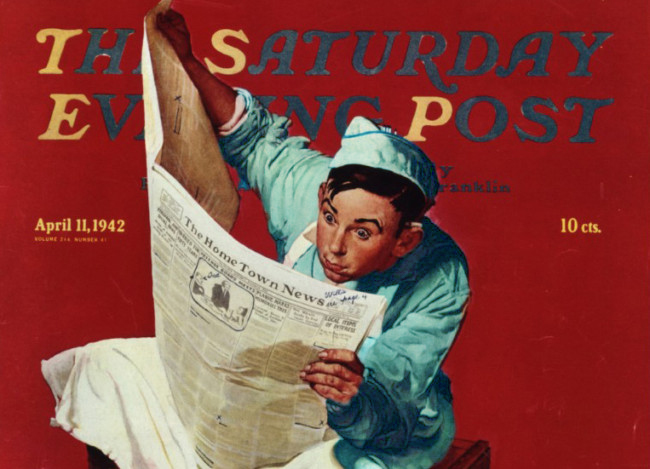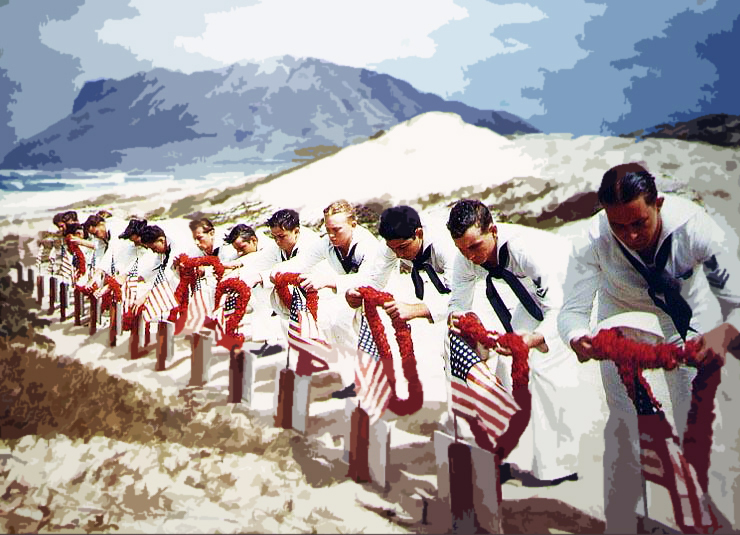
By refusing to agree to the firing of a nuclear torpedo at a U.S. warship, Vasily Arkhipov averts nuclear war on October 27, 1962
By refusing to agree to the firing of a nuclear torpedo at a U.S. warship, Vasily Arkhipov averts nuclear war: A senior officer of a Soviet submarine who averted the outbreak of nuclear conflict during the cold war is to be honoured with a new prize, 55 years to the day after his heroic actions averted global catastrophe.
On 27 October 1962, Vasili Alexandrovich Arkhipov was on board the Soviet submarine B-59 near Cuba when the U.S. forces began dropping non-lethal depth charges. While the action was designed to encourage the Soviet submarines to surface, the crew of B-59 had been incommunicado and so were unaware of the intention. They thought they were witnessing the beginning of a third world war.
Trapped in the sweltering submarine – the air-conditioning was no longer working – the crew feared death. But, unknown to the US forces, they had a special weapon in their arsenal: a ten kilotonne nuclear torpedo. What’s more, the officers had permission to launch it without waiting for approval from Moscow.
Two of the vessel’s senior officers – including the captain, Valentin Savitsky - wanted to launch the missile. According to a report from the U.S. National Security Archive, Savitsky exclaimed:
“We’re gonna blast them now! We will die, but we will sink them all – we will not become the shame of the fleet.”
But there was an important caveat: all three senior officers on board had to agree to deploy the weapon. As a result, the situation in the control room played out very differently. Arkhipov refused to sanction the launch of the weapon and calmed the captain down. The torpedo was never fired.
Had it been launched, the fate of the world would have been very different: the attack would probably have started a nuclear war which would have caused global devastation, with unimaginable numbers of civilian deaths.
“The lesson from this is that a guy called Vasili Arkhipov saved the world”, Thomas Blanton, director of the National Security Archive at George Washington University, told the Boston Globe in 2002, following a conference in which the details of the situation were explored.
Now, 55 years after he averted nuclear war and 19 years after his death, Arkhipov is to be honoured, with his family the first recipients of a new award.
The Guardian UK / Wikipedia / National Interest.org / Atomic Heritage.org /National Geographic / History.com
/ By refusing to agree to the firing of a nuclear torpedo at a U.S. warship, Vasily Arkhipov averts nuclear war on October 27, 1962 (YouTube) 

Understanding Military Terminology
National Policy
(DOD) A broad course of action or statements of guidance adopted by the government at the national level in pursuit of national objectives.
Joint Publications (JP 1) Doctrine for the Armed Forces of the United States
National Security
(DOD) A collective term encompassing both national defense and foreign relations of the United States with the purpose of gaining:
a. A military or defense advantage over any foreign nation or group of nations;
b. A favorable foreign relations position; or
c. A defense posture capable of successfully resisting hostile or destructive action from within or without, overt or covert.
See also Security.
Joint Publications (JP 1) Doctrine for the Armed Forces of the United States

The Old Salt’s Corner
“A Sailors Farewell”
Surrounded by angry, raging seas
Under a shrouded midnight moon
I think about loved ones dearly missed
I won't be seeing anytime soon.
Future plans come crashing down
Under the heavy pounding waves
I've traded my warm bed and loving arms
In exchange for an early watery grave.
Weep not for me my cherished children
For I could have been a better man:
I just hope I will be remembered
For providing as best for you I can.
Eternity now pulls and beckons me
I must say my last goodbye with tears
To you my love, please forgive me,
For not providing you more years.
~ Carl Fraser

“I’m Just Sayin”
“Try again,
fail again.
Fail better.”
“We are all born mad
some remain so.”
“Let us not waste our time in idle discourse!”
~ Samuel Beckett

“Thought for the Day”
“You will continue to suffer
if you have an emotional reaction
to everything that is said to you.
True power is sitting back
and observing things with logic.
True power is restraint.
If words control you,
that means everyone else can control you.
Breathe and allow things to pass.
~ Warren Buffett

“What I Learned”
“Why be difficult, when you can be impossible?”
“Why buy the cow, when the milk is free?”
“Why buy the entire pig, just to get a little sausage?”
~ Anonymous

Second Hand News (Links to Articles from Week 43 - October 21, 2019 - October 27, 2019)
 Power struggle: Acting chief of staff Mick Mulvaney allies accuse White House counsel Pat Cipollone of failing Trump on impeachment
• Chief Trump science adviser moves against foreign threat to research secrets
• Candidate for U.S. bishops top spot calls for addressing family breakdown and aggressive defense of the church
Power struggle: Acting chief of staff Mick Mulvaney allies accuse White House counsel Pat Cipollone of failing Trump on impeachment
• Chief Trump science adviser moves against foreign threat to research secrets
• Candidate for U.S. bishops top spot calls for addressing family breakdown and aggressive defense of the church
Senator Chuck Grassley suspects 'deep state' plot to cover up report on alleged FISA abuses
• Katie Hill becomes first female lawmaker to face House ethics inquiry over sexual relationship after naked photograph leaked
• 'Nine minutes to cry': Congresswoman asks Zuckerberg if he would want to be a Facebook content moderator
Battleground: 7 in 10 say U.S. ‘on the edge of civil war’
• Stephen Miller pushback: Washington’s “deep state” and “permanent bureaucracy” a mortal threat to America’
• Chuck Schumer is wrong and no law gives the Ukraine “whisteblower the right to anonymity”
Washington Examiner
 Kurds plead with U.S. soldiers pulling out of Syria as the president 'plans U-turn to leave 200 troops in the country' and U.S. soldier is spotted with banned patch of solidarity
• Recep Tayyip Erdogan pressing ahead despite outrage from Europe Recep Tayyip Erdogan pressing ahead despite outrage from Europe as he boasts to 'shown the entire world Turkey's military abilities'
• 'Betrayed' Kurds pelt U.S. troops with POTATOES as they pull out of northern Syria
Kurds plead with U.S. soldiers pulling out of Syria as the president 'plans U-turn to leave 200 troops in the country' and U.S. soldier is spotted with banned patch of solidarity
• Recep Tayyip Erdogan pressing ahead despite outrage from Europe Recep Tayyip Erdogan pressing ahead despite outrage from Europe as he boasts to 'shown the entire world Turkey's military abilities'
• 'Betrayed' Kurds pelt U.S. troops with POTATOES as they pull out of northern Syria
'You're busting my nuts, Khruschev': Hillary Clinton tweets spoof of Trump's letter to Turkish president with note she 'found in the archives' from Cuban missile crisis
• Veteran Tulsi Gabbard blames Hillary Clinton for the deaths of thousands of servicemen and calls her the 'embodiment of corruption' after former Secretary of State claimed she was a 'favorite of the Russians'
YouTube star PewDiePie who has more than 100 million subscribers is banned in China after mocking memes that liken President Xi to Winnie the Pooh in support of Hong Kong protests
• Mumbling Wikileaks founder Julian Assange fights back tears as he loses bid to delay extradition hearing that could see him sent to from the UK to the U.S. to face spying charges
Daily Mail UK
 CORRUPTION CHRONICLES: State Department MUST Be Transparent on Targeting of Media Journalists, Trump Allies
• “Investigating the Investigators:” The Left Loses its Mind in Jails Debate
CORRUPTION CHRONICLES: State Department MUST Be Transparent on Targeting of Media Journalists, Trump Allies
• “Investigating the Investigators:” The Left Loses its Mind in Jails Debate
• JUDICIAL WATCH INVESTIGATES IF OUSTED UKRAINE AMBASSADOR ORDERED STATE DEPARTMENT TO MONITOR JOURNALISTS, TRUMP ALLIES
Crime? Illegal Monitoring of Journalists & Trump Allies “Another Extension of #SpyGate”
• Trump Is REAL WHISTLE-BLOWER For Wanting to Investigate Deep-State Targeting!
• Did Obama Ambassador Order Monitoring of Journalists, Trump Allies?
Judicial Watch
 Dinosaurs Without Bones: Dinosaur Lives Revealed by their Trace Fossils.
Dinosaurs Without Bones: Dinosaur Lives Revealed by their Trace Fossils.
 2 of 4
2 of 4
 3 of 4
3 of 4
 4 of 4
4 of 4

Turing's Cathedral: The Origins of the Digital Universe.
 2 of 4
2 of 4
 3 of 4
3 of 4
 4 of 4
4 of 4

The Invention of Nature: Alexander von Humboldt's New World.
 2 of 8
2 of 8
 3 of 8
3 of 8
 4 of 8
4 of 8
 5 of 8
5 of 8
 6 of 8
6 of 8
 7 of 8
7 of 8
 8 of 8
8 of 8
 John Batchelor (10/27/2019)
John Batchelor (10/27/2019)

Mr. Answer Man Please Tell Us: How Are Serial Killers Classified: Modus Operandi, Signature, Staging & Posing?
Understanding and classifying serial killer crime scenes
The breakthrough idea of classifying serial homicide crime scenes according to an organized/disorganized dichotomy is credited to the former FRI agent and profiler Roy Hazelwood. This concept was based primarily on a study of thirty-six serial predators conducted by acclaimed FBI agents John Douglas and the late Robert Ressler.
Profilers use a list of factors such as whether the victim’s body was positioned or posed by the killer, whether sexual acts were performed before or after death and whether cannibalism or mutilation was practiced on the body. These factors are used to predict whether an unknown offender is an organized or disorganized killer. The organized/disorganized classification of offenders is the center piece of the FBI profiling approach and it is explained.

Organized Offenders
According to the offender and crime scene dichotomy, organized crimes are premeditated and carefully planned, so little evidence is normally found at the scene. Organized criminals, according to the classification scheme, are antisocial (often psychopathic) but know right from wrong, are not insane and show no remorse.
Based on historical patterns, organized killers are likely to be above-average intelligent, attractive, married or living with a domestic partner, employed, educated, skilled, orderly, cunning and controlled. They have some degree of social grace, may even be charming, and often talk and seduce their victims into being captured.
With organized offenders, there are typically three separate crime scenes: where the victim was approached by the killer, where the victim was killed, and where the victim’s body was disposed of. Organized killers are very difficult to apprehend because they go to inordinate lengths to cover their tracks and often are forensically savvy, meaning they are familiar with police investigation methods.
They are likely to follow the news media reports of their crimes and may even correspond with the news media. Ted Bundy, Joel Rifkin and Dennis Rader are prime examples of organized killers.

Disorganized Offenders
Disorganized crimes, in contrast, are not planned and the criminals typically leave evidence such as fingerprints or blood at the scene of the murder. There is often no attempt to move or otherwise conceal the corpse after the murder. Disorganized criminals may be young, under the influence of alcohol or drugs, or mentally ill. They often have deficient communication and social skills and may be below average in intelligence.
The disorganized offender is likely to come from an unstable or dysfunctional family. Disorganized offenders often have been abused physically or sexually by relatives. They are often sexually inhibited, sexually uninformed and may have sexual aversions or other pathologies. They are more likely than organized criminals to be compulsive masturbators. They are often isolated from others, live alone and are frightened or confused during the commission of their murders. They often do not have reliable transportation, so they kill their victims closer to home than organized offenders.
Significantly, disorganized killers will often “blitz” their victims—that is, use sudden and overwhelming force to assault them. The victim’s body is usually left where the attack took place and the killer makes no attempt to hide it. Jack the Ripper is a classic example of the disorganized serial killer.
It is also important to note that a serial murder case can also be a mix of organized and disorganized. This occasionally occurs, for example, when there are multiple offenders of different personality types involved in the killings. It can also occur when a lone offender is undergoing a psychological transformation throughout his killing career.

Modus Operandi and Signature
In addition to the organized/disorganized dichotomy, a serial killer may leave traces of one or both of the following behavioral characteristics: MO (modus operandi or method of operation) and signature—the personal mark or imprint of the offender. While every crime has an MO, not all crimes have a signature.
The MO is what the offender must do in order to commit the crime. For example, the killer must have a means to control his victims at the crime scene such as tying them up. Significantly, the MO is a learned behavior that is subject to change.
A serial killer will alter and refine his MO to accommodate new circumstances or to incorporate new skills and information. For example, instead of using rope to tie up a victim, the offender may learn that it is easier and more effective to bring handcuffs to the crime scene. The MO of Jack the Ripper, for example, was that he attacked prostitutes at night on the street with a knife.
The signature, on the other hand, is not required in order to commit the crime. Rather, it serves the emotional or psychological needs of the offender. The signature comes from within the psyche of the offender and it reflects a deep fantasy need that the killer has about his victims. Fantasies develop slowly, increase over time and may begin with the torture of animals during childhood, for example, as they did with Dennis Rader (“Bind, Torture, Kill”).
The essential core of the signature, when present, is that it is always the same because it emerges out of an offender’s fantasies that evolved long before killing his first victim. The signature may involve mutilation or dismemberment of the victim’s body. The signature of Jack the Ripper was the extensive hacking and mutilation of his victims’ bodies that characterized all of his murders.

Staging and Posing
The FBI profiler may also encounter deliberate alterations of the crime scene or the victim’s body position at the scene of the murder. If these alterations are made for the purpose of confusing or otherwise misleading criminal investigators, then they are called staging and they are considered to be part of the killer’s MO.
On the other hand, if the crime scene alterations only serve the fantasy needs of the offender, then they are considered part of the signature and they are referred to as posing. Sometimes, a victim’s body is posed to send a message to the police or public. For example, Jack the Ripper sometimes posed his victims’ nude bodies with their legs spread apart to shock onlookers and the police in Victorian England.
Psychology Today
• The Journal of the American Academy of Psychiatry and the Law (JAAPL).org
• Crime Traveller.org
• The Puppet Show
• U.S. Department of Justice National Institute of Justice (NCJRS.gov)
• Wikipedia

NAVSPEAK aka U.S. Navy Slang
God, Junior-Grade: (derisive): A superior.
Gold Crow: A 12+ year PO1 with good behavior. Very rarely, a PO2 (due to changes in high year tenure), which leads the question of how somebody can screw up that badly and still call it “good” behavior.
Gold Locker: Locked cabinet in the Engineering Spaces wherein the most valuable, precise, fragile, or one-of-a-kind tools are kept. “I could have fixed it but I don't have a key to the Gold Locker.”
Golden Dragon: A sailor who has crossed the Prime Meridian or the International Date Line into the Eastern Hemisphere.
Golden Shellback: A sailor who crossed the International Date Line and Equator at the same time.
Golden Screwjob: Used when a sailor has 12 years or more of honorable service, and, for reasons unknown, does not have his Gold rank device. A Golden Screwjob is never spoken of when the sailor in question is within hearing range.
Golden Rivet: The rivet, made of gold, which according to folklore every ship is built containing one of.
Goo: Instrument Meteorological Conditions (IMC). When an aviator flies an aircraft into the clouds, can no longer see the earth or the horizon, and is dependent on instruments for navigation, he is said to be “in the goo.” This is usually done intentionally when flying with an Instrument Flight Rules (IFR) flight plan, but can lead to high “pucker factor” when it is done accidentally.
Good Deal (Submarine Service): When a sailor receives an assignment that is viewed by others as better than theirs, despite the fact that this may not be the case. This includes missing underways/deployment for reasons of life-threatening illness, terminal disease, or the death of spouse/children.
“Did you hear that Steve got hit by a drunk driver last night? He broke seven ribs, his left femur, and is on a ventilator. They are pretty sure there is no brain damage, but they have him in a medically-induced coma until then. Looks like we're down a mechanic for deployment - Steve got the good deal.”
Good Humor Man: Reference to the Summer White uniform. This is an all-white short sleeve uniform that makes the wearer look suspiciously like the ice cream man.
Wiktionary.org

Just for you MARINE
Going High and to the Right: Losing one's temper or rationality; from the common error of a poor shooter to jerk the trigger and impact the upper right side of a target.
Gomer or GOMER: Antiquated slang for a stupid person, from the character Gomer Pyle; or as a backronym for “Get Out of My Emergency Room” used by corpsmen to refer to malingerers who faked illness to avoid duties.
Good Cookie: Good Conduct Medal.
Good to Go: Expression denoting that difficulties will be overcome; ready; well done or satisfactory.
Gook: Anything foreign or strange. In modern U.S. usage, “gook” refers particularly to Communist soldiers during the Vietnam War. It is generally considered to be highly offensive and viewed as a racial slur.
Wikipedia.org

Naval Aviation Squadron Nicknames
VX-9 Air Test and Evaluation (VX) - nicknamed the “Vampires”
United States Navy and United States Marine Corps - Naval Air Station - Naval Air Weapons Station China Lake, California: April 30, 1994 - Present.

Where Did That Saying Come From?

“The proof is in the pudding:”
Meaning: To fully judge how effective something is you need to use it for its intended purpose.
History: 'The proof of the pudding' is just shorthand for 'the proof of the pudding is in the eating'. That longer version makes sense at least, whereas the shortened version really doesn't mean anything - nor does the often-quoted incorrect variation 'the proof is in the pudding'. The continued use of that meaningless version is no doubt bolstered by the fact that the correct version isn't at all easy to understand.
The meaning become clear when you know that 'proof' here is a verb meaning 'test'. The more common meaning of 'proof' in our day and age is the noun meaning 'the evidence that demonstrates a truth' - as in a mathematical or legal proof. The verb form meaning 'to test' is less often used these days, although it does survive in several commonly used phrases: 'the exception that proves the rule', 'proof-read', 'proving-ground', etc. When bakers 'prove' yeast they are letting it stand in warm water for a time, to determine that it is active. Clearly, the distinction between these two forms of the word was originally quite slight and the proof in a 'showing to be true' sense is merely the successful outcome of a test of whether a proposition is correct or not.
'The proof of the pudding is in the eating' is a very old proverb. The Oxford Dictionary of Quotations dates it back to the early 14th century, albeit without offering any supporting evidence for that assertion. The phrase is widely attributed to Cervantes in The History of Don Quixote. This appears to be by virtue of an early 18th century translation by Peter Motteux, which has been criticised by later scholars as 'a loose paraphrase' and 'Franco-Cockney'. Crucially the Spanish word for pudding - 'budín', doesn't appear in the original Spanish text. It is doubtful that 'the proof of the pudding' was a figurative phrase that was known to Cervantes.
The earliest printed example of the proverb that I can find is in William Camden's Remaines of a Greater Worke Concerning Britaine, 1605:
“All the proof of a pudding is in the eating.”
It is worth remembering that, as the phrase is quite old, the pudding wouldn't have been a sticky toffee pudding from the sweet trolley, but a potentially fatal savoury dish.
In Camden's listing of proverbs he also includes “If you eat a pudding at home, the dog may have the skin”, which suggests that the pudding he had in mind was some form of sausage. THE OED describes the medieval pudding as 'the stomach or one of the entrails of a pig, sheep, or other animal, stuffed with a mixture of minced meat, suet, oatmeal, seasoning, etc., and boiled'.
Those of you who have ventured north of the border on Burns Night will recognize this as a fair description of a haggis - “the great chieftain o' the pudding-race”, as Burns called it in the poem Address to a Haggis, 1786. medieval peasants, faced with a boiled up farmyard massacre, might have thought a taste test to have been a wise choice.
Phrases.org UK

Science & Technology

Cool halo gas caught spinning like galactic disks
• Observations reveal gas stripping and enhanced star formation in the galaxy JO206
• Marine life recovery following the dinosaurs' extinction
• Study finds any single hair from the human body can be used for identification
• Corsica's 'cat-fox': On the trail of what may be a new species
• Unexpected culprit—wetlands as source of methane
Phys.org / MedicalXpress / TechXplore

Bizarre News (we couldn’t make up stuff this good - real news story)
The Tree That Might Have Inspired Dr. Seuss' 'The Lorax' Has Died

A Monterey cypress (Cupressus macrocarpa) that is thought to have inspired the Truffula trees in Dr. Seuss' “The Lorax” has fallen, according to news reports.
The shaggy tree was thought to be around 100 years old, according to Tim Graham, spokesman for the San Diego Parks and Recreation Department. It lived not in Truffula Valley, but rather in the arguably less-colorful Ellen Browning Scripps Park looking out over the coast of La Jolla, California, part of San Diego.
And rather than going out with a “THWACK!” at the hands of a Super Axe Hacker, this zany tree fell down. [Gallery: Oldest Living Things in the World]

The lone Monterey cypress tree, known to locals as the “Lorax tree”, was visible to Theodor Seuss Geisel, aka Dr. Seuss, from his mountaintop home in La Jolla, where he lived from 1948 until he died in 1991, according to the La Jolla website. It was at that mountain home that he wrote many of his books, including “The Lorax” (Random House), which was published in 1971.
“The Lorax” follows a monkey-like, mustached creature trying to defend the Truffula trees from corporate greed. This “speaker of the trees” was also likely inspired by a real-life observation, in this case the long-limbed patas monkeys that Geisel saw while on safari in Kenya, according to a Live Science report.
Graham told Live Science that it's unclear why the tree fell (they have a call in for the Lorax to speak for this tree). The tree was older, as far as this species goes, “but the arborist said that overall the tree was in good shape”, he said.
• Image Gallery: Carnivorous Plants
• 10 Species That Will Die Long Before the Next Mass Extinction
• In Photos: Medieval Skeleton Entangled in Tree Roots
Live Science (06/18/2019) 


SONG FACTS

“Sympathy For The Devil” - The Rolling Stones
Album: Beggars Banquet
Released 1968 
This perpetuated the image of the Stones as frightening bad boys, as opposed to the clean-cut Beatles. It was great marketing for the band, who got some press by implying an interest in the occult.
The lyrics were inspired by The Master and Margarita, a book by Mikhail Bulgakov. British singer Marianne Faithfull was Mick Jagger's girlfriend at the time and she gave him the book. Faithfull came from an upper-class background and exposed Jagger to a lot of new ideas. In the book, the devil is a sophisticated socialite, a ‘man of wealth and taste”.
Jagger claims this is about the dark side of man, not a celebration of Satanism.
Said Mick Jagger:
The original title was “The Devil Is My Name... Songs can metamorphasize, and 'Sympathy For The Devil' is one of those songs that started off like one thing, I wrote it one way and then we started the change the rhythm. And then it became completely different. And then it got very exciting. It started off as a folk song and then became a samba. A good song can become anything. It's got lots of historical references and lots of poetry.”
Keith Richards (2002):
“'Sympathy' is quite an uplifting song. It's just a matter of looking the Devil in the face. He's there all the time. I've had very close contact with Lucifer - I've met him several times. Evil - people tend to bury it and hope it sorts itself out and doesn't rear its ugly head. 'Sympathy For The Devil' is just as appropriate now, with 9/11. There it is again, big time. When that song was written, it was a time of turmoil. It was the first sort of international chaos since World War II. And confusion is not the ally of peace and love. You want to think the world is perfect. Everybody gets sucked into that. And as America has found out to its dismay, you can't hide. You might as well accept the fact that evil is there and deal with it any way you can. Sympathy for the Devil is a song that says, Don't forget him. If you confront him, then he's out of a job.”
The Stones played this at the Altamont Speedway concert in 1969 before a fan was fatally stabbed. The crowd got more unruly as the song went on. The Stones were playing “Under My Thumb”  when the stabbing occurred, but they did not perform “Sympathy For The Devil” for seven years after the incident due to the public outcry.
when the stabbing occurred, but they did not perform “Sympathy For The Devil” for seven years after the incident due to the public outcry.
Some of the historical events mentioned in this song are the crucifixion of Christ, the Russian Revolution, World War II, and the Kennedy assassinations. Robert Kennedy was killed on June 5, 1968, after Mick Jagger started writing the song. His original lyric was “who killed Kennedy?” referring to the 1963 John F. Kennedy assassination, but he changed it to “who killed the Kennedys?”
Other historical events alluded to in the song include the Hundred Years' War (“fought for ten decades”) and the Nazi Blitzkrieg (“the blitzkrieg raged, and the bodies stank”).
The “whoo-whoo” backing vocals were added when Richard's girlfriend, Anita Pallenberg, did it during a take and the Stones liked how it sounded. Pallenberg sang it on the record along with Keith Richards, Brian Jones, Bill Wyman, Marianne Faithfull and Jimmy Miller.
Stones producer Jimmy Miller:
“Anita (Pallenberg) was the epitome of what was happening at the time. She was very Chelsea. She'd arrive with the elite film crowd. During 'Sympathy For The Devil' when I started going whoo, whoo in the control room, so did they I had the engineer set up a mike so they could go out in the studio and whoo, whoo.”
The Stones performed this on Rock and Roll Circus, a British TV special The Stones taped in 1968 but never aired. It was released on video in 1995. During the performance, Jagger removes his shirt to reveal devil tattoos on his chest and arms.
The line, “And I laid traps for troubadours who get killed before they reach Bombay” possibly refers to the notorious Thuggee cult, who worshiped Kali, the Hindu goddess of death. They would waylay travelers on the roads of India, then kill the entire group in order to make off with their valuables. This seems to be the closest well known historical incident to fit the lyrics. Also, the Thuggee would have been well known in England, since the British Army put a stop to the cult during the colonial period.
Another interpretation is that the line refers to the hippies who traveled the “Hippie trail”, a passage through Turkey, Afghanistan, India and a few other countries that was popular in the counterculture community. Many of these travellers were killed and ripped off by drug peddlers in Afghanistan and Pakistan. Those shady deals could be the “traps”.
Fitting for a song about Satan, the song is heavy on the low end, with the bass, percussion and piano prominent throughout the track. The guitar doesn't come in until 2:50, when the solo comes in. It doesn't return until nearly two minutes later, when it returns for some licks. The Stones typically change the arrangement when they perform it live, bringing the guitar in for the first “pleased to meet you line”, sometimes punctuated with pyro or other visual elements.
Mick Jagger (1995):
“It has a very hypnotic groove, a samba, which has a tremendous hypnotic power, rather like good dance music. It doesn't speed up or down. It keeps this constant groove. Plus, the actual samba rhythm is a great one to sing on, but it's also got some other suggestions in it, an undercurrent of being primitive - because it is a primitive African, South American, Afro-whatever-you-call-that rhythm. So to white people, it has a very sinister thing about it. But forgetting the cultural colors, it is a very good vehicle for producing a powerful piece. It becomes less pretentious because it's a very unpretentious groove. If it had been done as a ballad, it wouldn't have been as good.”
“I knew it was a good song. You just have this feeling. It had its poetic beginning, and then it had historic references and then philosophical jottings and so on. It's all very well to write that in verse, but to make it into a pop song is something different. Especially in England - you're skewered on the altar of pop culture if you become pretentious.”
The Rolling Stones official site / Rock & Roll Hall of Fame / Billboard / All Music / Song Facts / Ultimate Classic Rock / The Rolling Stones
Image: “Beggars Banquet (album)” by The Rolling Stones

Trivia
●On July 16, 1945, three weeks before the atomic bomb was dropped on Hiroshima, it was tested for the first time where?
Answer to Trivia
● In 1843, Congress granted Samuel F.B. Morse $30,000 to build the first telegraph line between two cities located about 30 miles apart from each other. What were they?
Answer to Trivia
● Paper money wears out from constant handling and is sometimes damaged or destroyed. Which U.S. paper currency has the shortest life span, around 15 months?
Answer to Trivia
● One of the world's most expensive coffees, “Blue Mountain”, is grown and produced in which small Caribbean nation?
Answer to Trivia

A Test for People Who Know Everything
From the Jeopardy Archives Category - “FAIRY TALES ($200)
“In the Grimms' version, this creature becomes a prince not from a kiss but when he's thrown against the wall.”
● Answer for People Who Do Not Know Everything, or Want to Verify Their Answer YouTube
From the Jeopardy Archives Category - “FAIRY TALES” ($800)
“The 4 words that complete the line from ;Jack and the Beanstalk;, Fee, fi, fo, fum, I smell the...'”
● Answer for People Who Do Not Know Everything, or Want to Verify Their Answer YouTube
From the Jeopardy Archives Category - “FAIRY TALES” ($1,000)
“After the queen correctly guesses his name, this little man, in a rage, tears himself in two.”
● Answer for People Who Do Not Know Everything, or Want to Verify Their Answer YouTube
Answer to Last Week's Test
From the Jeopardy Archives Category - “HAIL! HAIL! CHUCK BERRY
(Alex: Today, October 18th would be Chuck Berry's 91st birthday)” ($200)
“Chuck was born in this Missouri city in 1926 & passed away nearby in 2017.”
● Answer: Heaven, Earth. Biography
From the Jeopardy Archives Category - “HAIL! HAIL! CHUCK BERRY” ($800)
“The many stars paying tribute to Chuck in the 1987 doc 'Hail! Hail! Rock 'n' Roll' included this 'Long Tall Sally'.”
● Answer: Methuselah. Rock & Roll Hall of Fame
From the Jeopardy Archives Category - “HAIL! HAIL! CHUCK BERRY” ($1,000)
“This 1958 Chuck classic about a guitar-playing wunderkind went! went! to No. 8 on the charts”
● Answer: Leprosy. YouTube

Joke of the Day
“A Lesson in Morals”

A Lesson in Morals
One day at the end of class, little Johnny's teacher asks the class to go home and think of a story to be concluded with the moral of that story.
The following day the teacher asks for the first volunteer to tell their story.
Little Suzy raises her hand. “My dad owns a farm and every Sunday we load the chicken eggs on the truck and drive into town to sell them at the market. Well, one Sunday we hit a big bump and all the eggs flew out of the basket and onto the road.”
When the teacher asked for the moral of the story, Suzy replied, “Don't keep all your eggs in one basket.”
Little Lucy went next. “My dad owns a farm too. Every weekend we take the chicken eggs and put them in the incubator. Last weekend only eight of the 12 eggs hatched.”
Again, the teacher asked for the moral of the story.
Lucy replied, “Don't count your chickens before they hatch.”
Next up was little Johnny. “My uncle Ted fought in the Vietnam war, and his plane was shot down over enemy territory. He jumped out before it crashed but could only take a case of beer, a machine gun and a machete. On the way down, he drank the case of beer. Then he landed right in the middle of 100 Vietnamese soldiers. He shot 70 with his machine gun, but then he ran out of bullets! So he pulled out his machete and killed 20 more. Then the blade on his machete broke, so he killed the last ten with his bare hands.”
The teacher looked a little shocked. After clearing her throat, she asked what possible moral there could be to this story.
“Well”, Johnny replied, “Don't f**k with Uncle Ted when he's been drinking.”



































